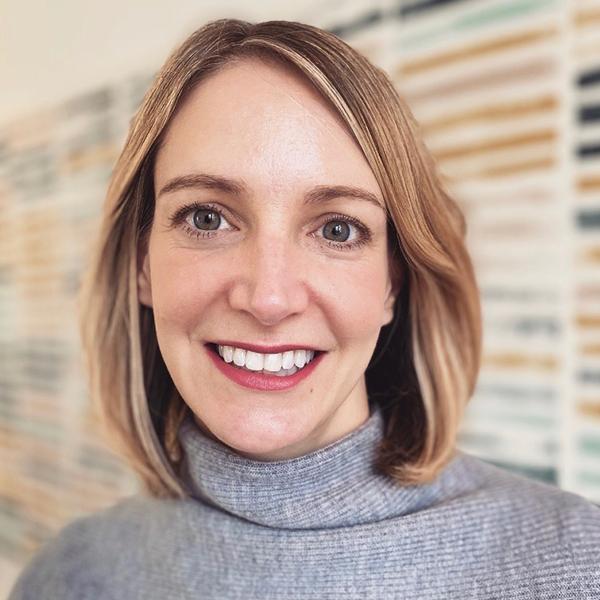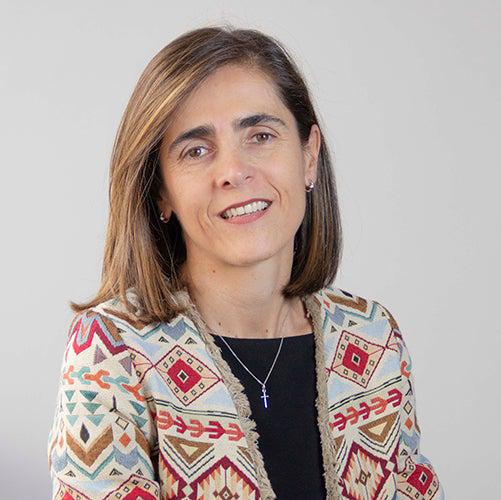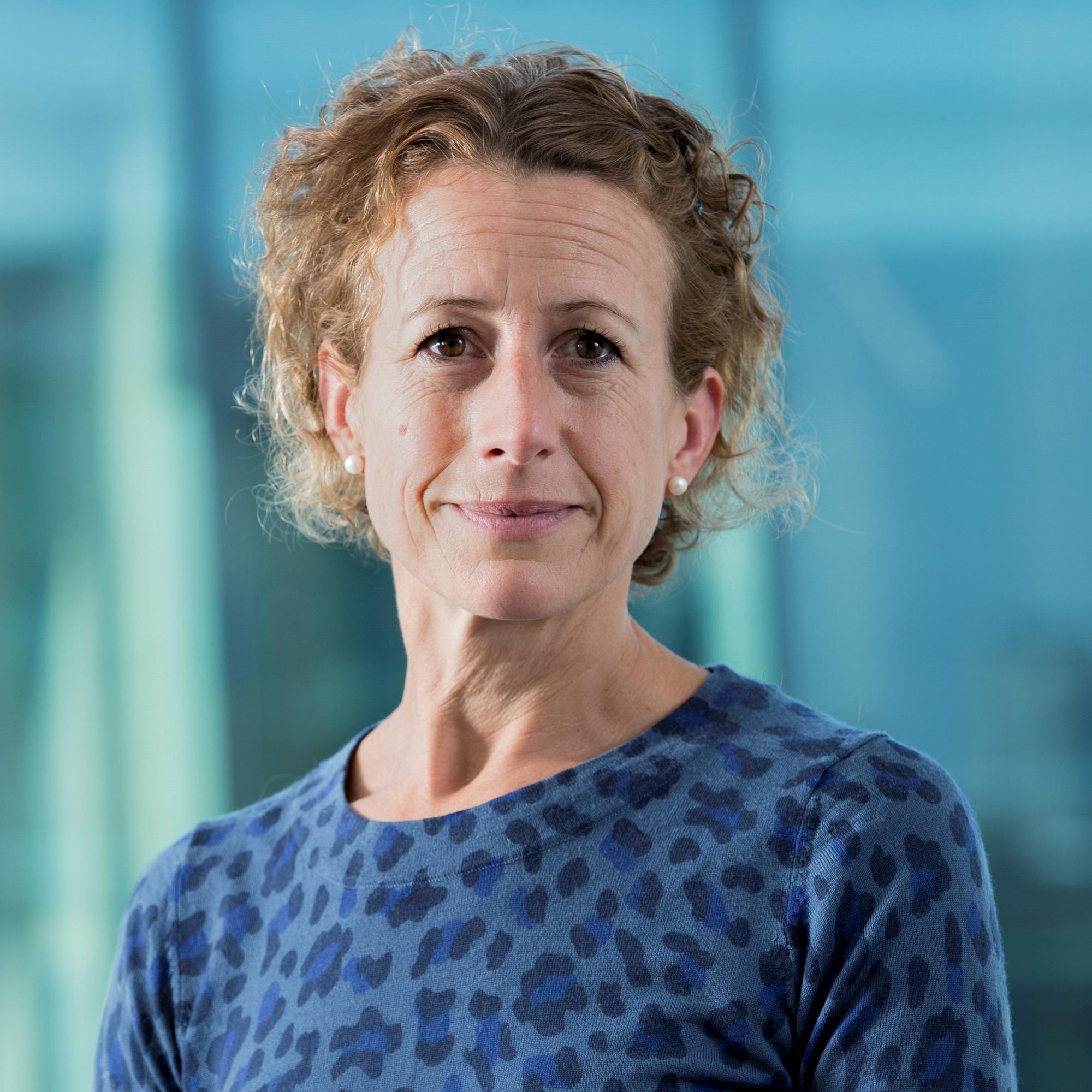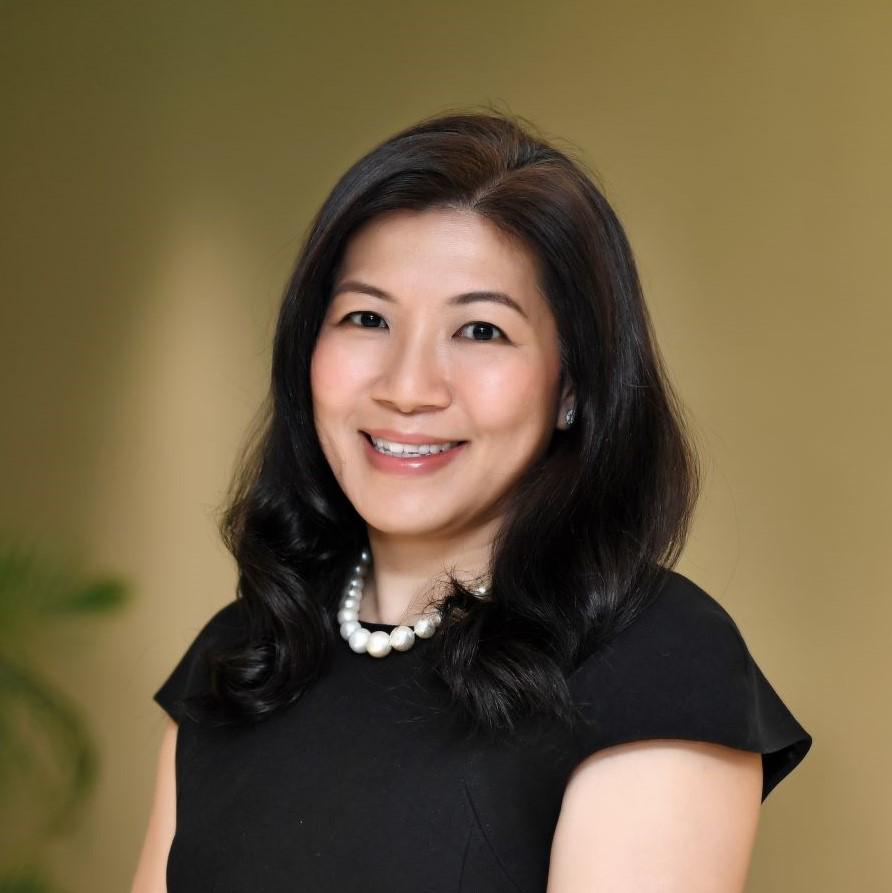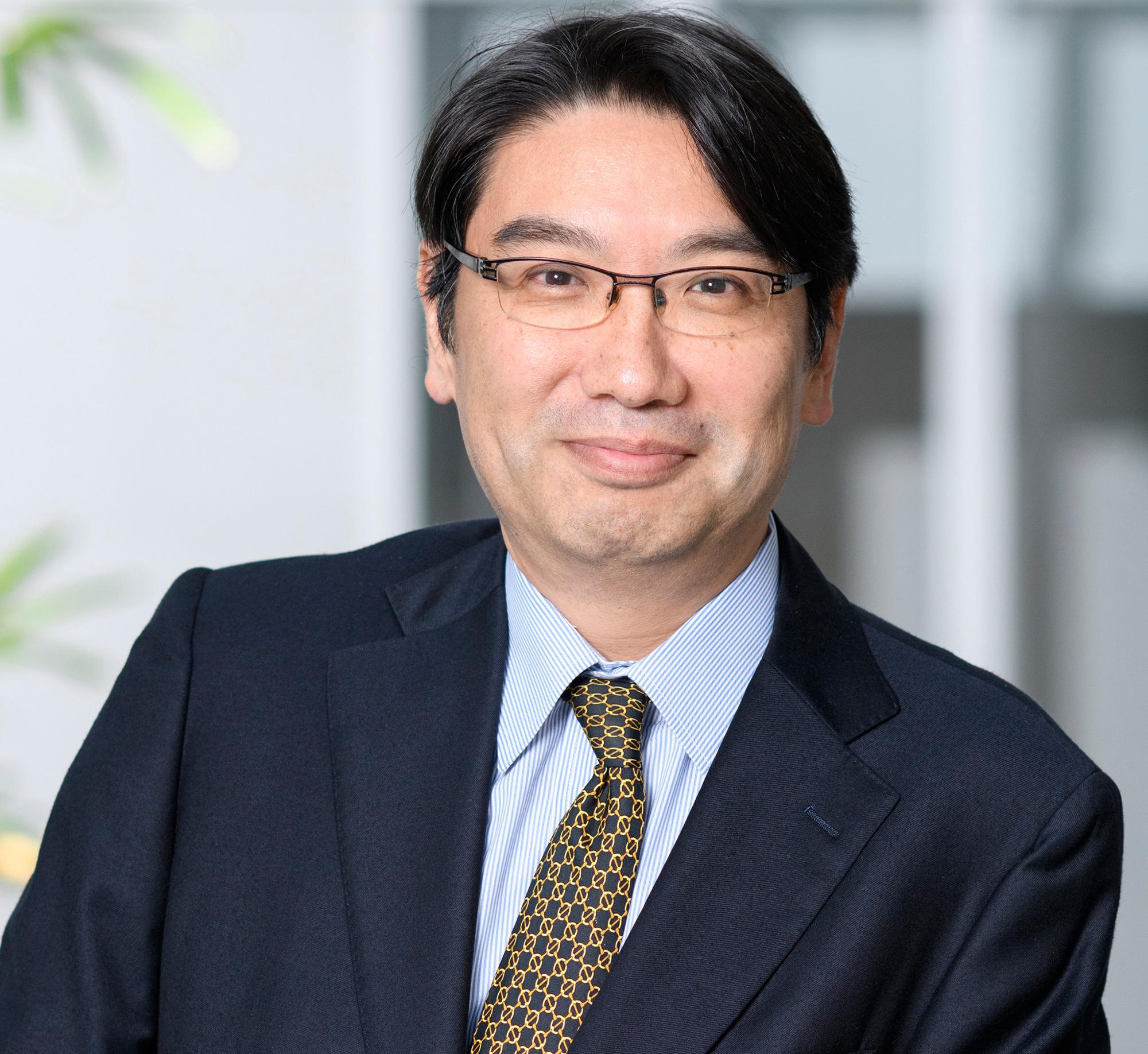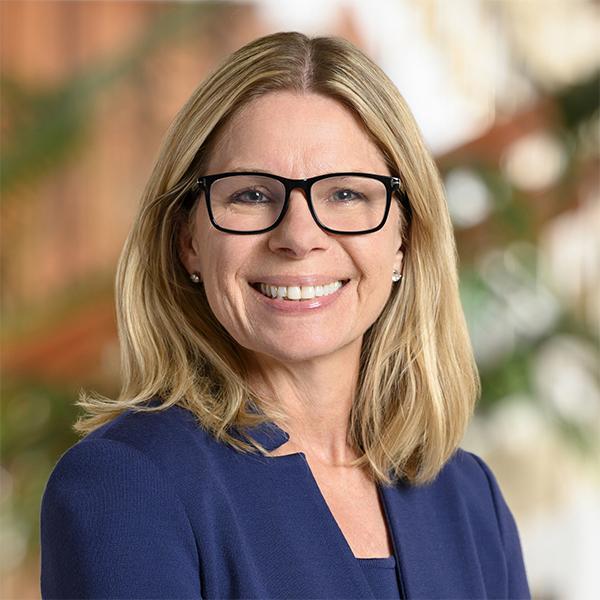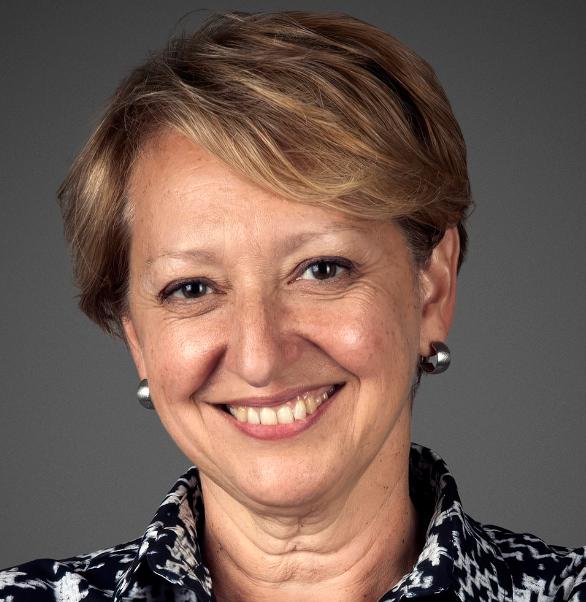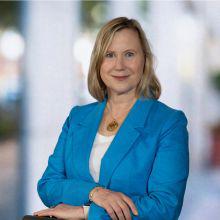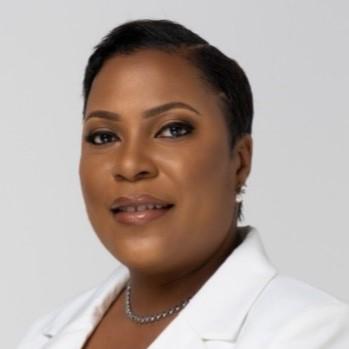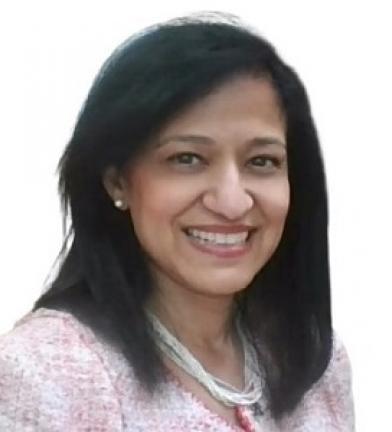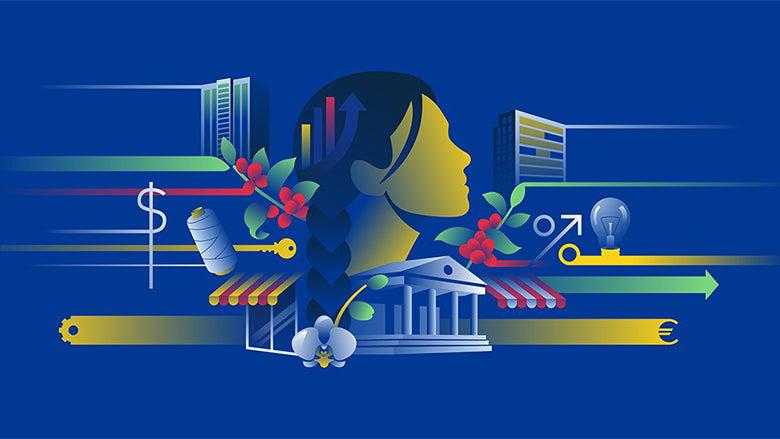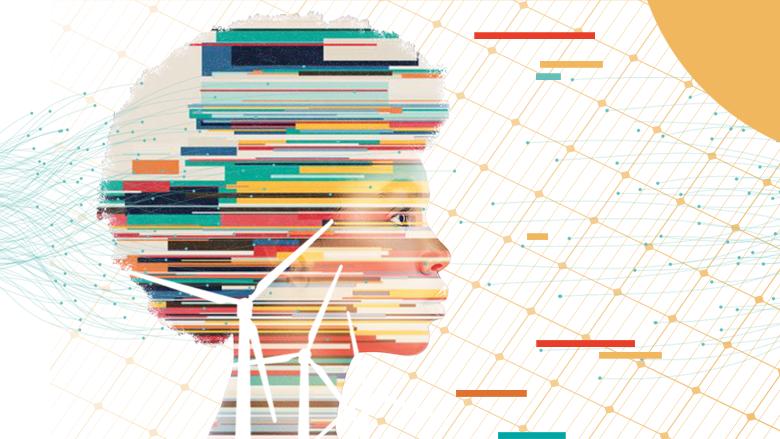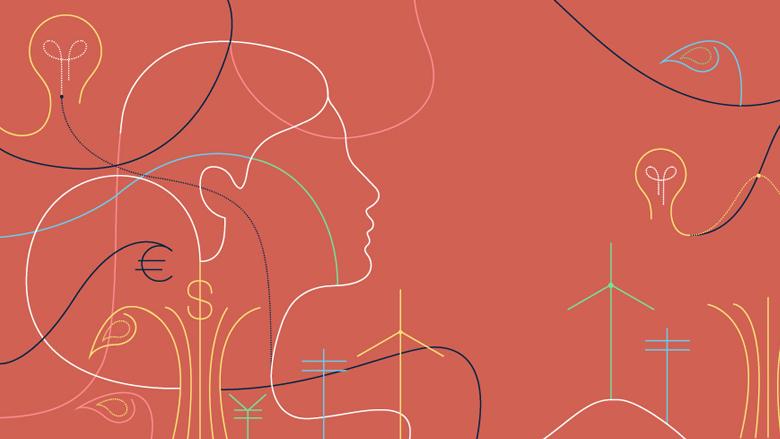[Sahar Berrada] Good morning, everyone, and thank you for joining us on International Women's Day for MIGA’s 9th Annual Gender Leadership Award. My name is Sahar Berrada and I am an advocate for diversity, equity and inclusion at MIGA this year. Together with my colleagues Asenath Mutumbi, Damien Boucher and Ubaldo Elizondo, we wish you all a very warm welcome. MIGA’s Gender Leadership Award originated in 2016 with the aim of recognizing leaders who have worked with MIGA and who have shown a strong commitment to advancing women's empowerment and gender equality. This year, we are delighted to be recognizing Ginette Borduas for her work as Partner and Head of ESG and Sustainability at Meridiam.
[Asenath Mutumbi] For today's program, we have an impressive list of speakers, starting with Hiroshi Matano, MIGA's Executive Vice President, and followed by our keynote speaker, Anna Bjerde, Managing Director of Operations of the World Bank. We will then have a panel, an impressive panel, to discuss how to promote a shift to a green and caring economy. We will conclude the event with a reception across the hall. This event is being streamed live on World Bank Live in English and francais. So, we welcome our online viewers, bienvenue a tous, apologies. If you would like to tweet about the event, please use the hashtag #IWD2024. I would like to invite Hiroshi to open this event. Hiroshi, the floor is yours.
[Hiroshi Matano] You know, it's good to see a lot of colleagues and familiar faces in the room, so I greatly appreciate this. Also online, I understand there's a lot of people, so thank you for that. Distinguished guests, ladies and gentlemen, welcome to the 9th MIGA’s Gender Leadership Award. As we all know, the world is facing multiple crisis and this reminds us of the challenges that women face around the world. But on International Women's Day, I find inspiration in individuals like our awardee, Ginette Borduas. Where is she? She's there. Hi. We are gathered here today to celebrate an extraordinary achievement of a leader who has dedicated over three decades of her life to further gender equality. The Gender Leadership Award was first established in 2016 to honor leaders who work with us and demonstrate a strong commitment to women's advancement and gender equality. Over the past eight years, we have recognized leaders who have demonstrated exceptional support for our mission to end extreme poverty and boost prosperity on a livable planet. I'm very happy that this year's MIGA Gender Leadership Award embodies the same spirit. Ginette’s story is an inspiration for all of us. In her 35 years of career, she has worked in ESG, optimizing sustainability of large-scale infrastructure projects in Latin America, in the Caribbean, in Africa and Canada. She has spent the last eight years at Meridiam, which is a great client for us, for MIGA, but also for IFC. Ginette has spearheaded the company's sustainable development approach and further developed its ESG procedure. She drives impactful large scale infrastructure project in Meridiam through active stakeholder engagement and expertise in sustainability implementation and monitoring. We're eager to learn from Ginette's experience. Through this Award, we hope to inspire other companies to commit to creating more opportunities for women. And although we have much more work to do, I would like to take this opportunity to thank our colleagues and staff at the World Bank Group for their excellent work to further advance gender equality. As you know, accelerating gender equality is not easy, but we have seen a dramatic rise in the share of the World Bank operation that addresses gender gap from 50% in physical year 17 to 95% in physical year 23. At the end of June 2023, IFC invested, mobilized investment and provided advisor service to its financial institution partners with a cumulative of 251 investment and advisor service projects in 76 countries. resulting in 10 billion in investment for financial institution targeting women, with 4.3 billion specially dedicated finance, women-owned and led SMEs. In physical year 23, MIGA also achieved a milestone with 1.2 billion in climate lending commitments to women and women-owned businesses mobilized through guarantees. In addition, going forward through the World Bank Group Guarantee platform, the World Bank hopes to substantially increase its guarantee insurance to 20 billion or more by 2030. And with gender being a clear focus for the World Bank Group, this means that our increased guarantees will also support projects that will focus on creating many more opportunities for women worldwide. One of the themes that the guarantee platform is to support is energy transition. So, I'm excited to hear from our impressive panelists about today's theme, “The Shift to a Green and Caring Economy”. I hope to hear their thoughts on how transitioning to a green economy can create opportunities to advance gender equality. Congratulations again, Ginette, and thank you all for coming, being here today to celebrate International Women's Day. And now, may I invite Anna Bjerde, Managing Director of Operations at the World Bank and a great friend to deliver the keynote. Thank you.
[Anna Bjerde] Good morning, everybody. Happy International Women’s Day to all the wonderful women in the room and online, and to all the wonderful men in the room and online because as I always like to remind ourselves, behind every great man there's a great woman. And sometimes ahead of every great man, there's a great woman. So still have some ways to go on that. But it's really a pleasure for me to be here today. And MIGA's events around this have always been such a milestone every year that I can recall in the Bank. So, for the last few years, I've been following this closely, and this time, it's the first time I actually get to speak at one of these events. So, I'm quite excited about that. Thank you for inviting me. I also had the chance to meet the MIGA Gender Leadership Award winner just now before we got out here, Ginette Borduas and I would like to really congratulate you, Ginette. This is an incredible recognition for the incredible work that you've done. And we also had an exchange in the room of being women who grew up doing infrastructure work, and you are a leader in infrastructure, and that's not often you see a woman in that field either. So, I really want to acknowledge you and inspire so many more women to follow in your footsteps. Your work and commitment to sustainability and environmental, social and governance procedures is really worth this recognition. The way Meridiam, under your leadership, has set a high standard for integrating gender equality into business practices is truly inspiring. But today, I'd like to challenge all of you here and in person and online, men and women, to use your voice and influence for gender equality because we are very far from where we should be in 2024. Earlier this week, the World Bank launched its latest Women, Business and the Law report. And the findings are actually quite shocking. The report finds that women have about two thirds of the rights of men, and that nowhere in the world, nowhere in the world do women have the same legal rights as men in all the indicators measured. Nowhere. The report includes 190 countries. And the analysis shows that no country provides equal opportunity for women, not even in the wealthiest economies. This is only half the picture. Despite laws promoting gender equality, less than 40% of countries have established the systems needed for their full implementation. This is unacceptable and we have a lot of work to do. This is why we need all of you to be allies in this fight. My personal source of hope lies in the women leaders, entrepreneurs, artists, farmers that I meet all over the world, each of them determined to make a difference and challenge the status quo. I was recently in Colombia, in fact, earlier this week, where I was able to witness firsthand how women have shaped the country's path to peace and are also at the forefront of environmental conservation in the Amazon. Last month, I had the opportunity to meet remarkable women in India and Bangladesh, women who are breaking through the glass ceiling and contributing to economic growth. Half of the world's population is female, and it should be a given that they should have the same access to resources and opportunities as males. But the sad reality is that around three quarters of all men participate in the labor force. Yet in South Asia, the number of women is only 25% and it's only 20% in the Middle East and North Africa region. This huge gender divide slows economic growth and stalls our progress towards equality. The world cannot achieve prosperity if we leave half of the population behind. The world cannot miss out on women's economic power. The mission of the World Bank Group to eradicate poverty on a livable planet places women and young people at the front and center. We are deploying our resources and energy to create much more opportunities for women. From empowering girls and children to stay in school in Africa, to providing credit to women-owned businesses in Latin America, we have a multipronged approach to addressing women's participation in the labor force. The World Bank Group provides advisory services to countries, helping them craft policies that focus on women's leadership and financing projects that put women's skills to work. Achieving our mission to increase women labor force participation requires more capital than what the multilateral development banks have at their disposal. That's why it's crucial for us to attract private sector capital investment in developing countries and we have used our guarantee instruments to bring the much-needed foreign direct investments in emerging markets. For example, with credit enhancement guarantees, Meridiam entered a public private partnership to design, construct, equip and maintain the 1300 bed Bursa City Hospital in Turkey. This project is helping Turkey increase the quality and efficiency of the healthcare system and enhance access to healthcare facilities to its people. In Gabon, guarantees are supporting the first private sector-led hydropower plant. Meridiam is building and operating this 35-megawatt project, which will avoid over 90,000 tons of CO2 emissions per year. MIGA supported Meridiam to acquire, operate and maintain Senegal's first 100% electric bus rapid transit system. This will not only provide safe transportation for women, but also increase access to the qualified jobs created by the project. This is a clear illustration of the One World Bank Group approach in which MIGA's assistance to Meridiam is built upon the financing support provided by IDA and advisory services by IFC to the project. These projects are not only contributing to the economies of the countries, but also creating much needed jobs, including opportunities for women. Let's try to picture the concrete impact that all of these projects have on women and girls. Women for whom taking care of a sick family member is made easier. Women for whom a house is connected to electricity opens a multitude of digital opportunities, girls who won't be forced to study in the dark after sunset, or young female professionals who can commute to work in a safe and secure environment. I could go on and on. The bottom line is that additional jobs will come from the green transition, and I'm keen to hear the panel discussion today on the shift to a green and caring economy. Women are at the heart of the World Bank Group's climate change agenda to build a sustainable and resilient future; we need to level the playing field for women in all sectors to realize our mission of ending extreme poverty on a livable planet. Thank you very much. [Applause]
[Sahar Berrada] Thank you, Anna, for these inspiring and compelling words. Now, before we hand the award to Ginette, may I ask you to join us in watching a short video showcasing Ginette’s accomplishments through her work at Meridiam.
[Ginette Borduas] I’m Head of ESG and Sustainability at Meridiam and I've been with Meridiam for eight years now.
[Jane Garvey] Ginette is one of our outstanding woman leaders. She came to us with 26 years of very excellent experience and a background primarily in the environmental world.
[Thierry Déau] Ginette has really embraced our mission, growing the spirit, but also the actions within our portfolio companies, also within Meridiam, and leading our entire sustainability practice. Sustainability for us is not something separate. It's at the heart of everything Meridiam does and that's why also Ginette is part of our executive committee and carries that flag throughout the company.
[Ginette Borduas] We identify investment opportunity and we start working on it. If it is aligned with our vision and our mission, then we will look for ways to optimize the project and make it as sustainable and resilient as possible. In Gabon, we have a hydroelectric power plant. We proposed to downsize it to reduce the impacts that it would have on biodiversity and on the need to relocate and replace infrastructure that were already existing. So, these are the type of actions that we will take in order to align our projects with the reality of climate change and the need to protect the environment. By developing projects a certain way, you will allow women to be part of the project to the design and the way it is implemented and the way it will unfold in the future. For instance, the BRT in Dakar, Senegal, which is an electrified bus system, the first one in Africa. We make sure to integrate the needs of women. We have specific measures to protect the safety of women with lit overpasses at specific hours, reserved seats in sections of the busses to cater the needs of the communities.
[Thierry Déau] For us wanting to invest heavily in emerging markets, MIGA has been the principal de-risking tools of ours. It's also easy to work with MIGA, because of the shared value, especially when it comes to environment, gender, fragile population and development.
[Jane Garvey] I think what you realize in this business is none of these problems can be solved in isolation, and it's that bringing together of people with different perspectives, fashioning some solutions, no one does that better than the World Bank.
[Ginette Borduas] Climate change will affect everyone, everywhere, but we often see women being more impacted because in many countries they don't necessarily have the resources to overcome the major impacts that will be generated. For that reason, when we design infrastructure assets, we make sure to integrate their needs and make sure to allow them to be part of the process.
[Jane Garvey] Anytime you bring a group of people together and you have diversity of thought, which is what women do. They will bring a different perspective to the table. Discussions are always, in my experience, richer, and I think the solutions that come out of the discussions are much better.
[Ginette Borduas] For me, it's about diversity, diversity of opinions, ideas, cultures. This is what makes our work richer.
[Thierry Déau] At Meridiam, we have the crossroads of two sectors that really don't promote gender equality, the construction and engineering sector and the finance sector, sort of occasionally. So we took action from the outset to address it with clear policy in terms of hiring, but also promotion and development. Ginette is one of the great outcomes of leadership from women within Meridiam.
[Ginette Borduas] I never felt that I was limited, that I couldn't do something, and I was lucky enough to be surrounded with people who had the same mindset than me. For me, what made the biggest difference, it's allowing more people with different views, different cultures, different experiences, to voice their opinion, to propose solutions to change the world. [Applause]
[Asenath Mutumbi] So, may I invite Ginette and Hiroshi for Hiroshi to present the award and to hear Ginette’s remarks.
[Hiroshi Matano] Congratulations. [Applause]
[Ginette Borduas] Well, that's a lot to take in. Thank you, Mr. Matano, for this great honor. And thank you, Ms. Bjerde, and all of you here today for your warm welcome. Thank you. Thank you so much. I feel privileged, proud, and at the same time humbled to be receiving this award, but to be honest, my profound dream, and I think that you have mentioned it earlier, is that one day, this price will no longer be needed, be necessary. No longer needed because there will be no more gender inequalities. No longer celebrated because women will be fully empowered. Imagine that in ten years, we meet again in the same exact room, but not to celebrate a gender related award. It would mean that we would collectively have achieved what is essential today. Equality, diversity and inclusion. Don't misunderstand my intention. Gender equality is for me, an utmost critical issue. When I was first informed that I would be receiving this important award, I did what many women do. I began doubting myself and the legitimacy of my experience and my expertise to be receiving such recognition. You know how it feels. But I guess I should address this question to the many women in the room who have experienced this feeling at least once in their lives. Funny how old habits die hard. I started reflecting; however, on why my work was worth mentioning. I realized that my story is one of many women around the world, and many women around me as well, and who I have admired over the years. It is a story of strong-willed women, truly passionate about their work, thinking that there were no limits to what they could achieve, and hoping. These women, hoping that what they were doing would contribute to raising the bar when it came to developing our cities, using the available resources, and planning our future. So, more than 35 years ago, I started working in the engineering sector, working in infrastructure with the majority of men. I was not always the most popular person in the room. Not only was I suggesting to the teams that we would have to modify the project to better address social and environmental issues, but it was coming from a woman who was not an engineer. But please, I see my colleagues here. Don't think that I don't appreciate engineers. I love them. Amongst the people I respect the most, there are many engineers, men and women, and without them, I wouldn't be here today. They were always open to all the good ideas and the new ways of doing things, but back then, when I started, sustainability and ESG were often an afterthought, something my colleagues would eventually have to address, with few mitigation measures added at the last minute to a project that was fully designed. I had to do a lot of convincing to raise awareness and keep my grounds in a room full of self-assured people. But how do you think I managed to overcome the challenge? Well, younger, my parents told me that nothing was impossible for me. And guess what? I guess I believed them. So, I never questioned myself. If I have one message that I would like for people to remember today, it is this. Everything is possible. Everything is possible for the people and diversity, for sustainability, for resilience of our world. And we must believe that together we can become the best version of ourselves. So, let's transform the impossible into the possible. Thank you. [Applause]
[Sahar Berrada] Thank you, Ginette, for these uplifting words and for sharing your story with us. Now, can I invite our panel moderators, as well as our panel moderator, as well as our panelists, to discuss this year's theme and hand it over to our Director of Legal Affairs and General Counsel, Aradhana Kumar-Capoor. Thank you.
[Aradhana Kumar-Capoor] Thank you, Sahar. I'm very excited to introduce this wonderful panel and then to have, hopefully, a lively discussion. And so let me start with introducing Uzoamaka Nwamarah, who is a Climate Change Adviser at The Commonwealth Secretariat. In her role, she provides strategic leadership and technical expertise to drive the implementation of Commonwealth Climate Change Program. She leads the Commonwealth NDC program, which supports member countries to expedite the attainment of their NDCs with on-ground technical assistance. Uzo also champions the Secretariat's Gender and Youth Climate Action program, ensuring that climate initiatives are inclusive and effective for men, women and young people, recognizing them as catalysts for positive change, particularly in the operational delivery of the Commonwealth Climate Finance Access and Commonwealth Living Lands. Before joining the Commonwealth Secretariat, Uzo excelled as a Principal Climate Finance Consultant with AtkinsRéalis UK, a Senior Climate Change Specialist with the African Development Bank in Tunisia and Ivory Coast, an Energy Policy Consultant with Camco UK and Sustainable Energy Officer with the East Midlands Regional Assembly in UK. So, a range of prior experience her extensive experience spans collaboration with national governments, regional bodies and international financial institutions. She's adept at advising and guiding them in designing and implementing low carbon and climate resilient policies, strategies, programs and projects together with climate finance, resource mobilization and capacity building. Uzo has a master's degree in Environmental Science and Technology from Imperial College London and a First Degree in Geology from Federal University of Technology in Nigeria. She's also a Certified Expert in Climate Adaptation Finance from Frankfurt School of Finance and Management. Uzo is a vetted Climate Resilience Expert for the UNDP and an Associate Member of the Energy Institute. Recognized for her outstanding contributions, Uzoamaka was named a finalist in the STEM (Science, Technology, Engineering, and Maths) Senior Leader category of the Black British Business Awards. She proudly serves as a member of the Court of Imperial College London and enjoys a fulfilling family life with her husband and three kids. Welcome, Uzoamaka. [Applause]
[Aradhana Kumar-Capoor] Let me now introduce Susan Lund, who many of you know. Susan is IFC's Vice President for Economics and Private Sector Development. She leads a large staff of economists that provide economic analysis to support IFC investments, including macroeconomic outlooks, country risk assessments and country private sector diagnostics. She's also responsible for AIMM, which is the Anticipated Impact Measurement and Monitoring framework of IFC to assess the development impact of IFC investments identifying opportunities to use blended finance concessional finance to enable investments in the lowest income and fragile nations and overseeing IFC's research and thought leadership. Prior to joining IFC, Susan had spent over 20 years as a partner at McKinsey & Company and leader of the McKinsey Global Institute. In that role, she served both as an active research economist and advisor to companies and policymakers around the world. Her published research has focused on the evolution of global value chains and trade, financial market development and technology, and the future of work. Widely cited in the global media, Susan frequently speaks at international conferences and regularly writes articles and op-eds for leading business publications. She's a member of the Council on Foreign Relations, the National Association of Business Economists, and the Bretton Woods Committee. She holds a PhD in Applied economics from Stanford University. Thank you for joining us today, Susan. [Applause]
[Aradhana Kumar-Capoor] And now let me reintroduce you to Ginette Borduas, our awardee for today. She is the Partner, Head of ESG and Sustainability at Meridiam. Ginette joined Meridiam in 2016 and her expertise covers, ESIAs, environmental permits and authorizations, environmental and social management plans, resettlement action plans and E&S capacity building. As Head of ESG & Sustainability, she ensures that the Funds operations comply and observe with the organization’s environmental, social and governance policies and procedures. Prior to joining Meridiam, she has been active in the field of environmental and social studies for more than 25 years. Her involvement covered all aspects of the planning, construction and monitoring of large-scale infrastructure projects in transport, energy, urban development and solid waste management. She has participated in all phases of project development, whether as a project director or coordinator, or as a human environment and institutional support expert. She has also held various several management positions, leading multidisciplinary departments offering a wide range of E&S services. Ginette has managed E&S projects in Canada as well as in Africa, the Caribbean, and Central and South America. She has a bachelor’s degree in Urban Planning and a graduate diploma in Applied Business Management. Welcome and congratulations, Ginette. [Applause]
[Aradhana Kumar-Capoor] So let me start by posing the first question to you, Ginette. Infrastructure projects have the potential to either perpetuate or alleviate gender equalities. How can we ensure that infrastructure projects are designed and implemented to address the specific needs and vulnerabilities of women and the marginalized communities?
[Ginette Borduas] Well, maybe I'll come back to what Thierry Déau said, because it's true that when you think about infrastructure, these are large scale assets, projects, and it's a bit counterintuitive to say that these projects will change how we perceive women or how we empower women or vulnerable groups in general, but if we recognize from the offset that these assets will, in fact change the lives of people. Then, you start thinking about these projects differently, and the first step is to recognize this, and then you can work on the different processes and procedures and tools to develop and implement in order to take these preoccupations of women, their needs, into account within each project, but this takes time, of course. And at Meridiam we have the time to do this because we invest for very long periods of time. So, that gives us, it's almost a luxury time today to be able to address these needs and engage with people and develop the project differently.
[Aradhana Kumar-Capoor] Thank you. And makes a lot of sense to make the time. Uzo, let me turn to you. In recent years, there have been increasing recognitions of the disproportionate impacts of climate change on women and girls, particularly in the vulnerable communities around the world. Could you elaborate on some of the specific ways in which climate change exacerbates gender equalities and what, if any, strategies can be employed to address these intersectional challenges effectively?
[Uzoamaka Nwamarah] Sure. Thank you so much for that. We've heard climate change affects everyone, affects men, women, young people. What we've seen and research evidence has shown, indeed, that the effects on women is more profound. And there are reasons for this. Like you said, there's the existing social inequalities. I think in Anna's keynote you had alluded to the fact that there's nowhere in the world where women have equal footing when it comes to economic, legal or political powers. Now, this is really important to acknowledge, because when you look at climate change, the level of exposure to climate impacts affects men and women differently. So, this is where the differentiated impacts come in. And again, the resilience, the way, the ability to respond to these impacts. Again, this is where you have different levels because of these inequalities to economic power, legal power and political power. This exists because of existing socioeconomic, sociocultural issues as well. And it impacts women's rights, responsibilities and opportunities. We see this when it comes to workload, especially in developing communities that are more vulnerable to climate. The workload is there, the limited opportunities to participate in decision making as well. And then, when it comes to resources, the access to those resources, the control of those natural resources as well, again, you have the climate impacts really exacerbating this. Clear examples, two clear examples where you have women responsible for household food in terms of getting water, in terms of getting wood, you find out that because of climate change, you have degradation in the natural resources, and this causes women to have to go further in terms of getting this water or food for their families. Now what does this mean? You're spending most of your productive time going out to look for these resources and this could also lead to what we're talking about, infrastructure. Now, you may find out you have to go further and go to new areas, more dangerous, safety issues as well, come into play here. There's some research that has been done by ICN and it shows, for example, some work that was done in Kenya, because of the recurring droughts, over 85% of their energy, the substantial energy they spend is just out there looking for water and this is really dilapidating for them. Another key example is whereby, and this is sociocultural norms, where if you would cast our mind back to the tsunami in Sri Lanka, the impact, and again, women and young girls are 14 times more likely to lose their lives in climate induced disasters, and that tsunami in Sri Lanka was really bad. Why? The skills for swimming, tree climbing traditionally linked to men and boys, for the kind of work they did. This was a vital skill to survive, which the women didn't have. So, you see climate induced disasters and these sociocultural norms being exacerbated here. In terms of how do you address this? I think that was the second half, like a really three-part question. But addressing this, the work we've done at The Commonwealth Secretariat. So, the work we do through our Commonwealth Climate Finance Access. So, we had to look at an evidence based, we looked at all 56 member countries’ NDCs. So, the Nationally Determined Contributions, which are national climate plans submitted to the UNFCCC to enact the Paris Agreement, we wanted to find out these key policy instruments on climate, how gender responsive are they? Now, looking at these, we were able to identify best practices. We built on that to find out what are the key things and just very quickly, in terms of, I was happy to hear when we talked about policies, you have to have clear policy alignment, looking at how to have inclusive policy development, we touched on meaningful engagement, getting the insights and perspectives of women in decision making as well. Now, when it comes to financing for gender, both in terms of making sure resources are available and also gender responsive budgeting to ensure that we are able to tackle at the operational level the key considerations, putting them in place to ensure that when we have projects and programs, they are clear criteria on engaging women in climate decision making and then skills. We touched up about STEM. It's clear, most of the climate finance flows are going into mitigation, which is linked with STEM, but the impacts are being felt now, adaptation is key and you need to have dedicated resources allocated for addressing these issues. We've seen good best practice examples in Vanuatu, wherein most of the National Determined Contributions are conditional upon receiving external financing. They have dedicated 20% of their national budgeting to making sure they have resources in this regard. Also, when it comes to resources, human resources, do we have the skill sets? And this is the next thing, you need to have the skill sets for a gender just transition. So, how are we making sure that we're equipping everyone, but also having dedicated focal points working on this? And then one of the key points is the evidence base. So, we've moved from the political ambit we are in, for example, at the level of the heads of government, we have the Gender Equality Act, and then you also then come down to the ministerial level, operations awareness, we're here, but how do we make sure that we're measuring and really looking at how these are being translated from policy into action? So, sex disaggregated data, capturing this and using it as a feedback loop to have better programs as well. So, these are a few of the things we've highlighted and what we've done in this regard. Thank you.
[Aradhana Kumar-Capoor] Thank you, Uzo. Those are very specific and very good points that you just made. So let me turn to you, Susan. Now, how can we ensure that climate finance is gender responsive and supports women's empowerment, livelihoods resilience building efforts at the local level?
[Susan Lund] Thank you. It's a really important question. Women today are the majority of the people living in poverty and extreme poverty. They disproportionately have unequal access to energy and electricity, and they're virtually all, I think it's safe to say, of the 2.6 billion people on earth who still cook with traditional biomass. And as you've heard from Uzo, women also are more impacted by climate effects today. So, we need to address these inequities as we think about climate finance, and we need to start by acknowledging that these decisions are not made in a normative vacuum. When we began this journey on climate adaptation and mitigation, I think a lot of funds were focused on being gender neutral or gender blind, but as companies like Meridiam have shown, we can't do that, that climate projects do have gender impacts, whether we intend them to have impacts or not. So, how do we change this? I think that, first of all, let me say we certainly don't know everything, but here's what we do know. There is the how we fund projects and then what we fund. In how we fund climate finance projects, we have to think about who are the end beneficiaries. We have to take a people-centered approach. The technicalities of emission reduction and so on are very important, but we have to consider where are the impacts, and we have to meet women where they are, which is traditionally in the informal sector. It's as small business owners and it's in the household. Now, when we do climate finance projects, we need to take a gender analysis. We need to have a fully funded gender action plan, and we need to set metrics for ourselves, both qualitative and quantitative, on what the gender impact of the project is going to be. And then, of course, we'd need to measure these results and report on them. Now, what about what we fund? So, here's the good news. I think there are win-wins for both addressing climate and empowering women economically. So, consider clean cooking fuels, by switching to clean cooking fuels, you're saving women's time in collecting fuel wood and in cooking, and you're improving air quality for the whole family. Just by doing this, it's been estimated that you could avoid 450,000 deaths each year in sub-Saharan Africa and save millions of dollars on health care cost. Or take the example of climate smart agriculture. In many countries, women are primarily the smallholder farmers. So, by spreading and deploying climate resistant, drought resistant, insect resistant seeds, and then by investing in small scale irrigation, you not only adapt to a hotter climate and more extreme weather events, but you're improving women's income and livelihoods. Or consider distributed renewable energy. Women and girls disproportionately lack access to energy, and it's typically in the home. So, by doing distributed renewables at the village level, you're addressing household electrification. One research study recently found that when households receive electricity, women are 20% more likely to then be able to work outside the home because of the time saved. So, there are many examples, I think, of how we can address both the climate challenge and empower women at the same time.
[Aradhana Kumar-Capoor] Excellent example, Susan. Thank you. So, now let me turn back to you, Ginette. Could you please share ways in which Meridiam incorporates these gender considerations into projects? And how does it contribute to promoting gender equality and empowerment in the communities where you operate?
[Ginette Borduas] Well, I said something about time and taking the time to do the work, to engage with the women, to engage with the vulnerable groups in order to identify their needs, their preoccupations, and the right solutions for them. We don't have across the board throughout all our projects at Meridiam, only one way to do this. It has to be adapted because not everyone is the same. The context is always changing, always different, and we have to be comfortable with this. And that's what we do at Meridiam with the teams, we do a lot of capacity building, we do a lot of training and onboarding, to make sure that they view this mission the same way than we do and it's not only the making of one person, it's not the ESG team, it's the making of all the teams at Meridiam. So, it starts with this, then project by project, we look for ways to improve the situation, we look for opportunities to optimize the project. And I'm looking at Raquel here, and who I was talking to yesterday, she's a colleague. We were discussing this initiative that was launched as part of one of our projects, because we have a hospital in Chile and it's set in kind of an underprivileged area, and even if the design was all done, the operation were happening, everything was, of course, running, but there was an initiative to let women use one of the alleys that goes up to the hospital to run small shops for them to be able to sell goods and produces. It not only brings them additional revenue, but it helps the visitors, it caters the needs also of the patients that cannot go very far and not leave the hospital. It's an idea. This was not planned, but this is what adaptation is as well. It's to find other ways as we go along to improve the project. And that doesn't mean that we will stop there. Maybe in five years, something else will come up. We need to be able to first think outside the box, but adapt everything that we do in order to be more relevant where it's happening.
[Aradhana Kumar-Capoor] Excellent. Very good points. Thank you, Ginette. Let me turn to you, Uzo. Now, how can we ensure that women's knowledge, priorities and needs are integrated into the climate, policies and programs?
[Uzoamaka Nwamarah] Thanks for that. And I just want to start by saying, when we say women, we need to know it's not just a homogeneous brush stroke, women, because I will explain this at two levels, we have the international level, where we engage and discuss, but we should not forget on the ground those that are closest to the impacts on the ground. And that's important when we're talking about how do we harness knowledge, especially when it comes to indigenous knowledge. I just want to really emphasize that point. Now, we've seen that women are usually the custodians of natural resources. They understand how, and I think you have mentioned this when you were giving your intervention about being able to use traditional techniques, and we've seen it where in Africa working on the Great Green Wall, and particularly in Gambia. When it comes to water resistant crops and also water harvesting that knowledge, it's important to really imbibe and embrace that. But again, getting to the international level, we've talked about the means of implementation, be it finance, technology, capacity building. And then, when you then have the intersection across all of these, you have a more robust response to climate. Now, the other level is in terms of age, we do have young women, and it's important for us to recognize the value young people bring to the table, especially when they are the ones that are going to live with the impacts of climate change the longest, not just seeing them as vulnerable, but recognizing the solutions that they can also bring in terms of innovation, the use of technology as well. I'm quite excited to be working with our Commonwealth Youth Climate Network and seeing the projects and ideas and solutions they're bringing forward to incubate this and take it to scale. So, yes, it's really important for us to recognize women, both old and young, as valuable contributors and really harnessing the knowledge that they bring to the table. And one key thing is around the decision-making processes. I don't know how many recall the COPs. So COP28 was last year in Dubai. We have COP29 this year in Azerbaijan. And you have the guiding body, more or less the leading body, that would guide the process of the negotiations, and then there was no woman on the committee. There was an uproar and revolt, but now that has been corrected, and they are capable women in their own rights, bringing to the table the perspectives and I think it's important that when everybody comes together, we would then have a more inclusive society that has really fair, equitable and effective policies to take to the table. Thank you.
[Aradhana Kumar-Capoor] Excellent points. Thank you. Susan, let me turn to you now. Looking ahead, what do you see as the key priorities and strategies for accelerating women's economic empowerment and what collective actions are needed for meaningful progress?
[Susan Lund] Thank you. That's such a big question. Worldwide, about half of women participate in the labor force, compared to 80% of men. So, there's a very big gap that we've got to fill. And there are many different actions that we're taking at the World Bank Group and beyond to try to close that gap. So, I'd start with just the foundational issues of hard and soft infrastructure. Women need transportation to work. They need safe and affordable transportation. In one recent survey in a country in the Middle East and North Africa, 47% of women said that they had turned down employment opportunities because they didn't have access to affordable, secure transportation. Or consider childcare. Study after study in the economics literature finds that when you provide childcare, women are able to work, increase their household income, and then invest more in health and education. In Chile, just providing after school programs for children increased women's chances of working 10%. In Kenya, providing vouchers for childcare for kids age one to three increased women's working by 20%. Then, of course, there's education, where the research is quite conclusive that in most, although I will say not all, countries, providing girls access to education improves their chances of working and increases their lifetime income for themselves and their households, but we've got to go beyond that. We can address where do women work? So, for instance, women are disproportionately working in industries like textiles and garment, in fisheries and in tourism. So, as an example, IFC has worked with the International Labor Organization on a program called “Better Work”. And it came after the tragedy in Bangladesh with the collapse of the garment factory about 10, 15 years ago to really set standards for the garment industry and women's working conditions. Not only wages, but the quality of work and access to childcare on site. Women need access to finance. We know that when women have the capital they need, they do amazing things. We're very proud to have a program called “Banking on Women” that now has a portfolio of 4.3 billion dollars directed towards women business owners to support themselves and their families. And then finally, I'll just end with women in leadership. It's incredibly important that young girls see role models. They see possibilities for their life and achieving what they want. I think that all of us on this stage today will say that we're standing on the shoulders of giants, of all the women who came before and broke the glass ceiling and pursued their dream, got their education and did what they want. We now need to pay it forward to the next generation. And to bring it back to the green, caring economy, I will point to a study I recently saw from UK Aid that said that companies that have gender balance management and boards are more likely to reduce their energy consumption, reduce emissions and reduce water usage. So, back to our theme of I think that we can address climate in a way that actually addresses women's needs as well.
[Aradhana Kumar-Capoor] Excellent. Thank you so much, Susan. That was excellent. So, I'm just going to throw a question out and all of you, to all of you, how can organizations foster a culture of inclusivity to create pathways for women to assume leadership roles in driving the transition to green economy? I know Susan just touched upon that, but to all of you, please, Ginette, go ahead.
[Ginette Borduas] I can start. I feel like I'm stating the obvious here, but it's all a question of the culture of the organization. But culture is not something you buy, it's not something you invent from scratch, saying that “I want to be something,” you have to feel it, you have to do it every day, you have to embrace it. And it's in sometimes the smallest gestures that you feel that it is really embedded or integrated in the organization. and it will become attractive even for people outside the organization because it will be strong, it will be well integrated, and it will be lived by everyone in the organization. That being said, once you make basically your wish list and what you want to become, then, yes, you can work on your processes, you work on your procedures, you can have objectives and goals, and that helps bring everyone together on the one mission, one view, one set of objectives for the future.
[Aradhana Kumar-Capoor] Thank you, Uzo.
[Uzoamaka Nwamarah] I'm going to say you need to be clear in your intent and set very clear targets with clear indicators on how you're supporting the women in your organization. Also equip not only the women, but also the men, like your management and staff as well, and make sure you track and then learn from what your evidence is showing you, and go back again to keep getting better, so that that cycle keeps moving, and then you have the evidence to show for it. I like the quote you gave. There's several out there. I think even the latest McKinsey report shows that when you have women at the helm of affairs, you actually do have better profits as well; but overall, I think we should all be responsible for making sure that our organizations, where we work, where we spend most of our lives, are inclusive and helping us thrive in not only our professions, but not subjecting any one person not to live to their fullest. So, it's a win-win for everyone.
[Aradhana Kumar-Capoor] Thank you. Thank you, Susan. The last minute.
[Susan Lund] Well, I think, I will not repeat what's been said, but I would add, in addition to the clear targets, I think that the recognition that there is an unconscious bias is really important. I grew up in the economics profession and very underrepresented by women still today, but even worse, I won't say how many years ago that I was a student. We often joked like we had to basically act like men to succeed. Right? So, I think that there's a lot and today, every major organization has unconscious bias training. And it's about accepting people, and there are different styles and women have different styles, and accepting that that's valid, even if it feels less familiar or comfortable. But I'll end with a great quote that I heard earlier this week during the many celebrations of International Women's Day, it's from Shirley Chisholm, who 100 years ago was an American feminist and activist who was the first woman to run for president, this was back in the 1920s, and I think one of the first women elected to Congress, and she has a great quote that says, “If there's not a seat at the table, bring a folding chair.” [Applause]
[Aradhana Kumar-Capoor] I want to thank this wonderful panel. I think we had a very interesting discussion on, of course, climate resilience, how to do infrastructure projects with policies, finance, skill sets, etcetera, but I do want to say thank you to all of you for raising our awareness on how we can get better in bringing gender into our everyday work. I want to thank them for inspiring us with their answers on the last question and how we can look forward and pay it forward, as you said. Thank you to everyone here for supporting us, all women and all the men in the room who are acknowledging the International Women's Day. And to Ginette's point to end with that, we hope that we won't need that in the future, that it will be equal. Hundred years, and hopefully we won't have to wait another hundred years for that. Thank you all. Thank you.
[Asenath Mutumbi] Thank you, Aradhana. Thank you, Ginette. Thank you, Uzo. Thank you, Susan. Aradhana. For those inspiring words. If I may just ask you to stay a little bit for a photo, if that's okay. And Hiroshi, you're welcome to join as well. This concludes the formal part of this morning's event. I would like to thank all of you for coming and for all of you who joined us online and for those of you who are here in person, as I mentioned earlier, I hope you can join us across the room for a light reception and in celebration of International Women's Day and for Ginette's incredible work in furthering equality. Thank you very much. Merci. [Applause]


